My grandson, Manu, has become obsessed with the Eeentsy Weentsy Spider. We’ve spent large chunks of the last three days singing the song and looking at a small strand of spider web dangling from the hallway ceiling. “That’s the eeentsy weentsy spider’s house,” I tell him. He doesn’t seem to mind that the spider isn’t there, or that I’ve chosen not to reach up and grab the web for him. I think it’s the idea of a spider and a spider web that intrigues him more than the actuality. In fact, today, I couldn’t find the spider’s web at all, but it still didn’t stop him from looking longingly at the ceiling and talking about the spider as if it were there.
I’m impressed with his ability to switch gears to imagination when reality is less satisfying–a common attribute of children that we often lose as adults. Sometimes, I still miss the imaginary friends I had when I was three (maybe because they loved me unconditionally and there were never any relationship issues to work out, LOL!) But when I can access it, imagination has served me well in getting out of my stuck writing places, especially when I’m trying to fictionalize something that had its origin in a lived experience. The further I can get away from what really happened, whether that’s changing everything I can about a “character’s” appearance and demographics, altering the setting, re-thinking alternative ways the chain of events could have played out, etc., the freer I am to get past my own vulnerability to the emotional truth of the story I want to tell.
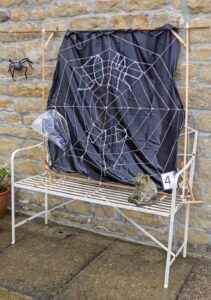
Tim Green from Bradford, CC BY 2.0 <https://creativecommons.org/licenses/by/2.0>, via Wikimedia Commons
And then, of course, it’s hard not to think about spiders without conjuring Charlotte’s Web, which we must have read to our daughter (Manu’s mom) at least ten times–before she was old enough to read it to herself at least ten more times. And I can’t even count how many times I’ve seen the movie. The book is about a pig on a farm who befriends a spider, who saves him from becoming ham and bacon by writing words in her web: “Some Pig,” “Terrific,” “Radiant,” and “Humble.”
Of these words, the one that sticks with me (with web-like sticky threads) is “humble.”
Having two books come out in the last six months has been a challenge to maintain what I consider an appropriate level of humility, especially as book marketing experts encourage me to scream, scream, scream from the social media rooftops and spend my days looking for places to plaster my “products” anywhere they might be seen.
And that is SO not my style.
I admit I may have a problem with too much humility, which the Mussar (a Jewish spiritual learning paradigm) equates with a tendency toward self-effacement. Yet, even posting about recent things I’m proud of (like getting short listed for the grand prize and winning first runner up in short stories for the Eric Hoffer Award, or doing a podcast about Here in Sanctuary–Whirling on the Bill Newman Show, or announcing/sharing upcoming readings or poems that were accepted in various journals feels like I’m on the edge of too little humility (equated in the Mussar as arrogance).
But, hey…I just got that all in, even if it was back-handed.
I don’t want this to be another “Dina Kvetches about Marketing” post. So, I’ll just say what I said to my friend, Alice, when we were studying the Mussar together: I want my writing to be recognized for what it’s saying and how it’s saying it. I don’t want it to be about me. In other words, it’s the message, not the product, and I’m not really interested in me or my books being thought of as commodities.
And if all this is just rationale for more self-effacement, I’ll counteract it right now by sharing a poem from Here in Sanctuary–Whirling, because it’s about a spider.
NOTE FROM THE AIR BNB IN TEXAS
“Please Don’t Kill the Spider”
He has a name: Septimus
because he lost a leg somewhere.
You might find him by the toilet.
Don’t shriek as you do your doo.
His poison is all in your head.
Didn’t you read Charlotte’s Web?
Humble is the word that matters.
Confront your failings. Take a selfie
if you’re lucky enough to spot him.
And put on your boots, hat.
This is cowboy country
land of brash bravado.
Where’s your gun?
A spider could be lurking under your pillow.
Unseen children taken at the border:
their parents’ lost limbs.

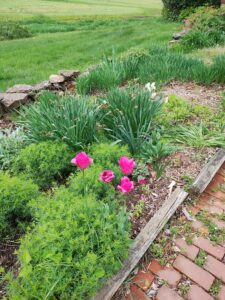
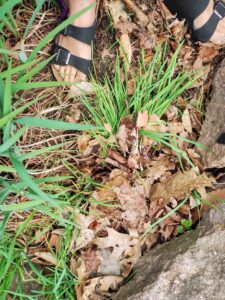

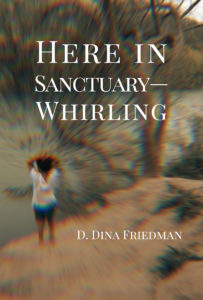 But now that I’m–thankfully–about 80% recovered, and preparing for my
But now that I’m–thankfully–about 80% recovered, and preparing for my  He was reportedly the only person in weeks that people had heard about who received a positive outcome form the infamous tent courts. And as witnesses gathered around to offer him a place to stay for the night and assistance to get to his brother in Florida, he told us the key to his “success.” I told them the gangs had killed my entire family. Other than my brother, I have no one.
He was reportedly the only person in weeks that people had heard about who received a positive outcome form the infamous tent courts. And as witnesses gathered around to offer him a place to stay for the night and assistance to get to his brother in Florida, he told us the key to his “success.” I told them the gangs had killed my entire family. Other than my brother, I have no one.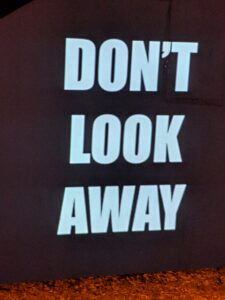 Don’t Look Away! the sign read on the American side of the border, where witnesses stood every day, reminding us of our responsibility not to tune out.
Don’t Look Away! the sign read on the American side of the border, where witnesses stood every day, reminding us of our responsibility not to tune out.